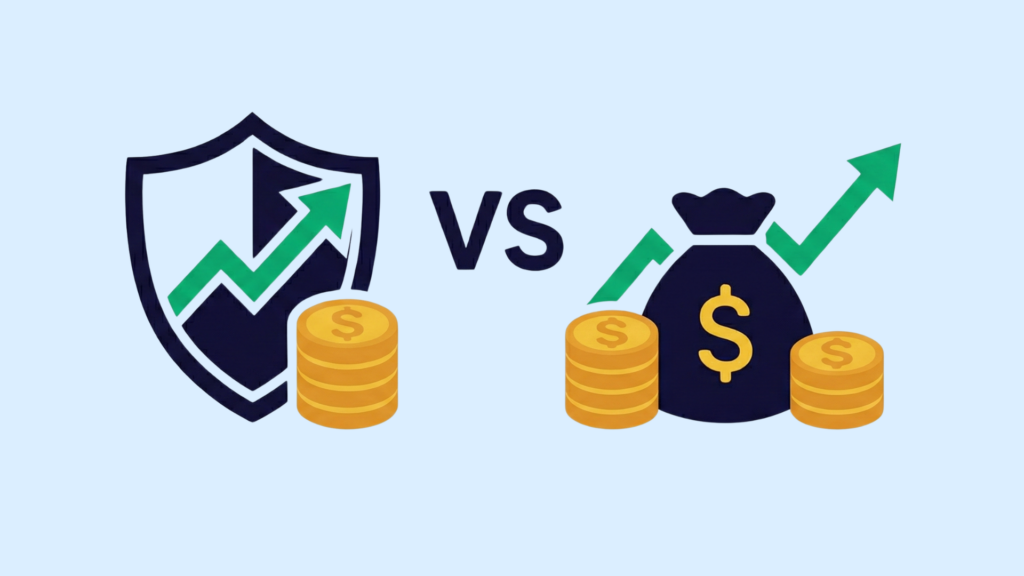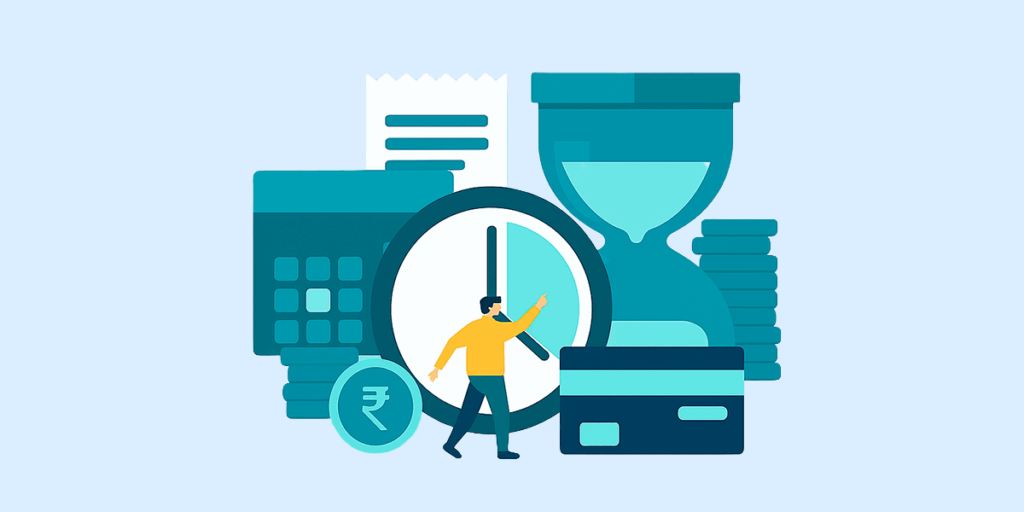IDCW mutual funds are designed for investors who want regular income without fully redeeming their investment, offering a blend of periodic payouts and market participation.
These funds, instead of reinvesting profits, distribute a portion of income or capital gains to investors as cash flow. In this blog, we’ll explain what IDCW funds are, how they work, their types, benefits, limitations, and when they make sense for your investment goals.
Understanding IDCW Mutual Funds
The IDCW payout option in mutual funds is a distribution option in which the investor receives regular distributions that may include both the fund’s earned income (such as dividends or interest) and a portion of the capital invested.
Unlike traditional dividends (which are paid only from profits), IDCW allows the fund house to return part of the capital if earnings fall short. This structure ensures consistent distributions but also lowers the Net Asset Value (NAV) of the fund after each payout.
Key Features of IDCW Mutual Funds
IDCW mutual funds are for investors seeking regular cash flow rather than capital appreciation. They blend the pros of market participation with the convenience of periodic payouts.
IDCW in Mutual Funds
In mutual funds, the IDCW option allows investors to receive income whenever the fund house declares a distribution. These payouts are deducted from the scheme’s NAV, reflecting a partial withdrawal from the investor’s holdings.
Key aspects include:
- Payouts depend on fund performance and fund house (AMC) discretion — not fixed schedules.
- The NAV decreases post payout, as the distribution is drawn from the fund’s corpus.
- Investors can choose between a payout option (receiving cash) or a reinvestment option, where distributions are automatically reinvested to buy more fund units.
How IDCW Payout Works
The IDCW payout process involves the fund declaring a specific amount per unit as income distribution. Once declared, the payout is credited directly to the investor’s bank account or reinvested as new units, depending on the chosen option.
Here’s how it works:
- The fund earns profits or receives income from its portfolio.
- The fund house declares an IDCW amount based on available distributable surplus.
- The declared payout is deducted from the fund’s NAV, slightly lowering the value per unit.
- Investors receive the payout in cash or as reinvested units.
Types of IDCW Mutual Funds
IDCW mutual funds are available across different asset classes, allowing investors to choose based on their goals, risk appetite, and income needs. The two main categories are:
Equity IDCW Funds
Equity IDCW funds invest primarily in stocks or equity-related instruments while following the IDCW payout structure. These funds distribute income to investors when they book profits on their equity holdings.
Key points:
- The payouts depend on market performance; if the equity portfolio performs well, the fund may declare higher or more frequent IDCWs.
- Since the payout may include both profits and part of the invested capital, the NAV of the fund typically drops after each distribution.
- Ideal for investors looking for market-linked growth with occasional income, such as retirees or conservative equity investors.
Debt IDCW Funds
Debt IDCW funds invest mainly in fixed-income securities such as bonds, government securities, and money market instruments. They are usually less volatile than equity funds and aim to provide stable and predictable IDCW payouts.
Key points:
- Payouts are often more regular than equity IDCW funds, as debt instruments generate steady interest income.
- These funds are better suited for conservative investors or those looking for regular cash flow with lower risk.
- The IDCW may still reduce NAV slightly after every payout, as it’s deducted from the fund’s total value.
Advantages and Disadvantages of IDCW Mutual Funds
Like any investment option, IDCW mutual funds come with their own benefits and trade-offs.
Advantages of IDCW Funds
- Regular Income: IDCW funds provide periodic cash flow, making them suitable for retirees or investors who need supplemental income.
- Flexibility: Investors can choose from payout and reinvestment options, depending on whether they prefer regular cash or compounding growth.
- Straightforward Taxation: IDCW payouts are subject to Tax Deducted at Source (TDS) (if the payout exceeds ₹5,000 in a financial year), and the distribution is added to the investor’s income and taxed at their applicable slab rate.
Disadvantages of IDCW Funds
- Reduced Capital Growth: Every payout lowers the fund’s Net Asset Value (NAV), which can slow long-term wealth accumulation.
- Tax Implications: IDCW distributions are taxable as income in the investor’s hands, which can be inefficient for those in higher tax brackets compared to capital gains tax.
- Not Suitable for Aggressive Growth: Since part of your investment may be paid back as a distribution, IDCW funds are less effective for investors seeking maximum capital appreciation.
When to Invest in IDCW Mutual Funds
IDCW mutual funds are a good choice for investors who value regular cash flow and want to stay invested in the market without fully redeeming their holdings. However, they’re not the best fit for everyone.
Ideal for Income-Seeking Investors
IDCW mutual funds are best suited for investors who want periodic income from their investments while maintaining market exposure.
Best suited for:
- Retirees or senior citizens who rely on regular payouts to cover living expenses.
- Conservative investors who prefer moderate returns with the option of liquidity.
- Investors with short- to medium-term goals, such as supplementing income during career breaks or funding recurring expenses.
Why it works:
- Provides a steady stream of income without selling fund units.
- Keeps your investment partially intact, allowing for potential capital appreciation over time.
- Offers flexibility to choose payout or reinvestment options based on cash flow needs.
When to Avoid IDCW Funds
While IDCW funds are good for some investors, they might not be the best for those who want long-term growth and compounding returns.
Avoid IDCW funds if:
- You’re a young or long-term investor focused on capital appreciation.
- You prefer your earnings to be reinvested automatically to maximise compounding benefits.
- You expect consistent or guaranteed payouts; IDCW distributions vary and are not assured.
- You’re sensitive to tax deductions; IDCW payouts are taxable, and TDS applies above ₹5,000 per year.
Why it’s better to avoid: Frequent payouts reduce the NAV of your investment and limit the compounding effect that drives long-term growth.
Conclusion
IDCW mutual funds offer a flexible way to earn regular income while staying invested in the market, making them useful for investors who prioritise cash flow over long-term capital appreciation. By combining income distribution and capital withdrawal, they provide liquidity without requiring full redemption of your holdings.
However, IDCW funds are not meant for everyone. They work best for retirees, conservative investors, and those seeking periodic payouts, but may not suit individuals focused on wealth accumulation and compounding.
Frequently Asked Questions (FAQs)
Which is better, SWP or IDCW?
Both SWP (Systematic Withdrawal Plan) and IDCW (Income Distribution cum Capital Withdrawal) provide regular income, but they work differently.
SWP lets you withdraw a set amount from your mutual fund at regular intervals; you control how much and when. Whereas, IDCW depends on when and how much the fund house decides to distribute.
Is IDCW good for retirement?
IDCW in mutual funds can be useful for retirees seeking periodic income, but it’s not always reliable. The payouts depend on fund profits and management decisions, meaning they can fluctuate or even stop temporarily.
Can I change IDCW to growth?
Yes, you can switch from the IDCW option to the Growth option of the same mutual fund. However, this is treated as a redemption and reinvestment, which may trigger tax implications (capital gains tax).
Is IDCW a guaranteed payout?
No, IDCW payouts are not guaranteed. The fund house may distribute income only if the scheme generates sufficient profits or surplus. The payout frequency and amount can vary (monthly, quarterly, or irregularly) depending on fund performance.
Disclaimer
The information provided in this article is for educational and informational purposes only. It should not be considered as financial or investment advice. Investing in stocks involves risk, and it is important to conduct your research and consult with a qualified financial advisor before making any investment decisions. The author and publisher are not responsible for any financial losses or gains that may result from the























